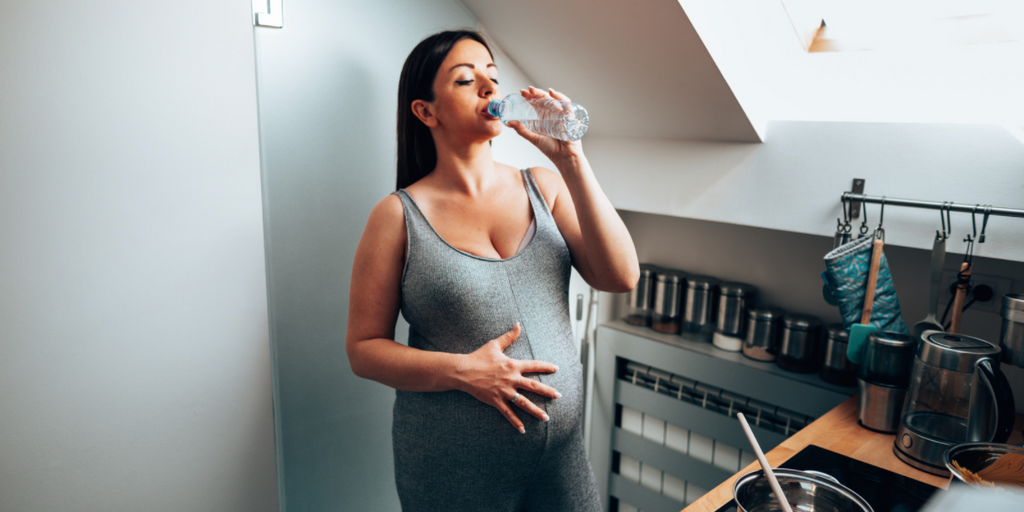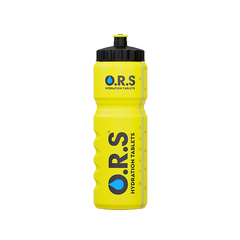Dehydration during pregnancy

Many expecting mothers face a level of dehydration. Dehydration is the result of the body losing water faster than the one taking in. During pregnancy it is of particular importance to stay well hydrated as the body goes through several rapid changes.
Being pregnant means that your body has increased needs of water intake as it is of critical importance for the healthy development of the baby. Two thirds of the weight gained is made up of water which is used by the baby. Water is vital for healthy blood cells and is essential for lactation as it is a key component of breastmilk. In the first trimester, morning sickness which is a very common symptom in more than 50% of the expected mothers results in a significant loss of electrolytes and fluids. The placenta is formed with water which allows the baby to receive nutrients during pregnancy. Amniotic sac also required water which is formed at a later stage.
So both the mother and the baby require high amounts of water intake. The result of dehydration is that the body struggles to cope with its normal functions which adds up to the increased needs that the body required during pregnancy. If dehydration will not be treated on time and effectively it can result in serious complications.
BENEFITS OF WATER
A number of women find that drinking water regularly ease the symptoms of morning sickness, indigestion as well as acidity and heartburn. Moreover, it maintains the body temperature and keeping it cool in hot and humid climates.
Furthermore, water prevents urinary infections which occur more often during pregnancy. At the same time, it eases conditions like hemorrhoids, constipation, oedema and water retention.
SYMPTOMS OF DEHYDRATION
Early signs include thirst and dry nose and mouth, tiredness and headaches. A common symptom of dehydration is also maternal overheating. Other symptoms include dark coloured urine and passing urine less often than usual. When there is enough water in the human body it allows to regulate body heat. Thus, signs of overheating means dehydration.
At the same time dehydration makes urine color to have a dark yellow color as opposed to a clear urine color when the body is well hydrated.
EFFECTS OF DEHYDRATION
Dehydration results in increased body temperature which can result to heat exhaustion and muscle cramping. Many serious complications can be caused as a result of dehydration during pregnancy. The most common ones include decreased amniotic fluid, insufficient breast milk production, neutral tube defects as well as premature labor.
A very serious effect on the baby will be not to be enough amniotic fluid for the baby which will have a direct effect on its growth. At the same time deficiency in the amniotic fluid can make the fetus instead of floating in the sac to lie again the uterus which can cause physical deformations. Therefore, due to all of the above birth defects can be caused as a consequence of inadequate water and nutrition support of the baby.
Dehydration is one of the commonest reasons for labor contractions along with bladder infections and impending birth. Dehydrations causes blood volume to decrease resulting in increased levels of oxytocin. Oxytocin is the hormone regulating contractions meaning that it results to preterm labor.
DEHYDRATION RISK FACTORS DURING PREGNANCY
Morning Sickness & Hyperemesis Gravidarum
Although, more than 50% of pregnant women experience morning sickness in early stages of pregnancy, only 2% experience hyperemesis gravidarum. Morning sickness causes vomiting, increased sweating and frequent urination which speed up the loss of water and electrolytes. Moreover, nausea stops the body from drinking fluids to replace the losses which makes rehydration challenging.
Hyperemesis Gravidarum causes persistent nausea and vomiting that threatens the health both of the mother and the baby. The symptoms are often confused with the ones from morning sickness.
However, during this condition, symptoms are more severe and persist for a longer time throughout the pregnancy. Symptoms include extreme nausea, sever vomiting, inability to keep down food and fever which results in sweating and increased loss of fluids. This condition causes 50,000 women to hospitalize each year in England as it results in rapid loss of fluids and electrolytes.
Diarrhea
Diarrhea during pregnancy can be a result of sudden dietary changes, increased hormone production or sudden sensitivity to certain foods during pregnancy. During the third trimester and near the due date diarrhea is more common. Diarrhea results in loss of fluids and electrolytes and this is why is known as a leading cause of dehydration.
Age
Being over the age of 35 can be a risk factor. As we age our bodies become less capable to preserve water.
PREVENTING DEHYDRATION DURING PREGNANCY
The simpler step is drinking plenty of water and fluids. At least 8-12 glasses are required on a daily basis. Furthermore, reducing consumption of products and drinks that contain high caffeine is also important as caffeine increases the urine output which can cause dehydration.
Avoiding activities that can cause overheating will prevent dehydration including exercise or spending a significant time in a hot environment. However, exercise is considered as a healthy option during pregnancy. Thus, drinking plenty of fluids during and after exercises as well as taking electrolytes after exercise are recommended.
Electrolytes which can be found as a food supplement allow the body to replace lost fluids, minerals, salts and sugars.
It is advised to speak to your doctor before taking them, especially if gestational diabetes has been developed during pregnancy or if you have pre-existing diabetes. Moreover, make sure to talk to your doctor if symptoms of dehydration are extreme or persist for a long time even though you have taken actions for it.
If dehydration persists mother will require to be hospitalized and get IV fluids to replace the hydration levels in the body.
PREVENTING DEHYDRATION DURING PREGNANCY
The simpler step is drinking plenty of water and fluids. At least 8-12 glasses are required on a daily basis. Furthermore, reducing consumption of products and drinks that contain high caffeine is also important as caffeine increases the urine output which can cause dehydration.
Avoiding activities that can cause overheating will prevent dehydration including exercise or spending a significant time in a hot environment. However, exercise is considered as a healthy option during pregnancy. Thus, drinking plenty of fluids during and after exercises as well as taking electrolytes after exercise are recommended.
Electrolytes which can be found as a food supplement allow the body to replace lost fluids, minerals, salts and sugars.
It is advised to speak to your doctor before taking them, especially if gestational diabetes has been developed during pregnancy or if you have pre-existing diabetes. Moreover, make sure to talk to your doctor if symptoms of dehydration are extreme or persist for a long time even though you have taken actions for it.

